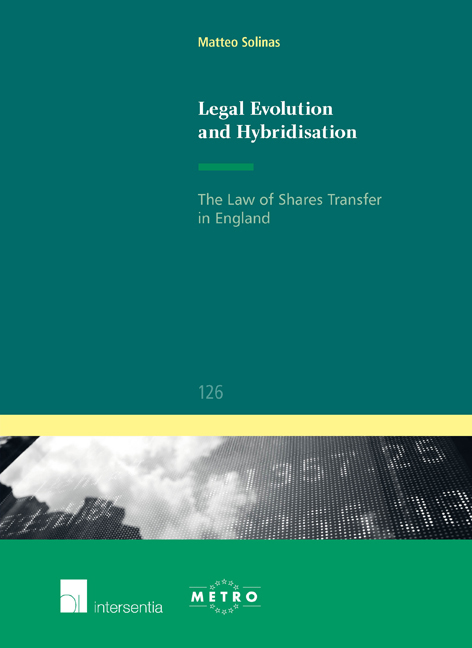Book contents
- Frontmatter
- Foreword
- Preface
- Acknowledgements
- Contents
- Table of Cases
- Introduction
- PART I THE IDEA OF HYBRIDITY IN COMPARATIVE LAW
- Chapter 1 The Debate on the Diffusion of Law
- Chapter 2 The Leitmotif of the Book
- Chapter 3 Hybridisation and Legal Reception
- Summary of Part I
- PART II THE CIRCULATION OF SHARES
- PART III THE TRANSFER OF (INTERESTS IN) SHARES
- Summary of Part III
- Conclusions
- Bibliography
- IUS COMMUNE EUROPAEUM
Chapter 1 - The Debate on the Diffusion of Law
from PART I - THE IDEA OF HYBRIDITY IN COMPARATIVE LAW
Published online by Cambridge University Press: 22 November 2017
- Frontmatter
- Foreword
- Preface
- Acknowledgements
- Contents
- Table of Cases
- Introduction
- PART I THE IDEA OF HYBRIDITY IN COMPARATIVE LAW
- Chapter 1 The Debate on the Diffusion of Law
- Chapter 2 The Leitmotif of the Book
- Chapter 3 Hybridisation and Legal Reception
- Summary of Part I
- PART II THE CIRCULATION OF SHARES
- PART III THE TRANSFER OF (INTERESTS IN) SHARES
- Summary of Part III
- Conclusions
- Bibliography
- IUS COMMUNE EUROPAEUM
Summary
Understanding the pattern, meaning and significance of the circulation of legal paradigms and ideas across national frontiers is a central theme in comparative law. Recently, this has attracted a great deal of academic interest especially under the impetus of studies on globalisation, convergence among legal systems and the unification of private law.
Many themes and views have emerged, but, for the most part, the debate has centred on the appropriateness of describing and explaining the phenomenon in terms of legal transplants. There is concern both over this mode of innovation in law and over the conceptual framework suggested by the terminology. It is said in particular that borrowing and imitation are not relevant in understanding the pattern of legal evolution and that ‘since a transplanted institution continues to live on its old habitat as well as having been moved to a new one, the choice of the word transplant is inappropriate’.
A critical overview of the theory of legal transplants and a discussion of its major criticisms are presented below.
The Terms of the Debate
Legal Transplants
Orthodoxy
The notion of ‘legal transplant’ as metaphor for the movement of law from one country to another belongs to Alan Watson's pioneering works on legal change. It was later adopted by many and today it represents the predominant terminology.
Observing the historical and comparative pattern of the reception of Roman law in most countries of medieval, renaissance, and nineteenth century continental Europe, Watson suggested that borrowing had been the most fertile source of legal growth. Legal evolution, he maintained with a variety of accents, rarely stems from isolated national innovation (creatio ex nihilo), but is rather the result of borrowing from other jurisdictions, or the ‘moving of a rule […] from one country to another, or from one people to another’. More fundamentally, by contrast to one of the most established preconceptions of modern legal thought, according to which legal development is a rational response to existing social, economic and political circumstances, Watson argued that the scale of the empirical evidence of legal transplants shows that law has a vitality of its own and does not necessarily progress in a rational way. In other words, he rejected the postulate that law is a mirror of society, that there must be a close relationship between law and the society in which it operates.
- Type
- Chapter
- Information
- Legal Evolution and Hybridisation , pp. 7 - 22Publisher: IntersentiaPrint publication year: 2014



